VAAVV 2015 – Featured Speakers
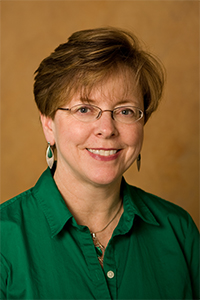 Nancy Haigwood, PhD
Nancy Haigwood, PhD
Oregon Health Sciences University
Keynote Speaker
Nancy L. Haigwood, Ph.D., is a Senior Scientist, Professor of Molecular Microbiology and Immunology, and Director of the Oregon National Primate Research Center at Oregon Health & Science University. She led the preclinical development of one of the first HIV vaccines at Chiron Corporation and was founding director of the Viral Vaccines Program at the Seattle Biomedical Research Institute. The primary focus of her research is the role of neutralizing antibodies in mother-to-child transmission of HIV-1 and the development of novel vaccines designed to elicit these antibodies. She has published over 100 peer-reviewed articles, in addition to many commentaries and book chapters. Dr. Haigwood is a board member of Cascade AIDS Project in Portland OR, and of the National Association for Biomedical Research in Washington, DC. At NIH she serves on the Council of Councils, which advises NIH Director Dr. Francis Collins, and the Vaccine Research Center Board of Scientific Counselors. Dr. Haigwood was elected a Fellow of the American Society for Microbiology in 2014.
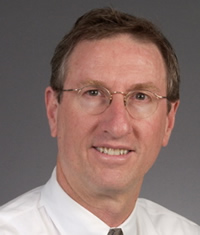 Jim Mullins, PhD
Jim Mullins, PhD
University of Washington
HIV genetic variation and vaccine immunogen design
Jim Mullins, Ph.D. is a Professor of Microbiology and Medicine at the University of Washington. Dr. Mullins obtained his Ph.D. in Cell Biology and Biochemistry from the University of Minnesota in 1978. He did postdoctoral work at the California Institute of Technology before becoming Assistant then Associate Professor at the Harvard University School of Public Health. In 1989 he moved to Stanford University as Professor and was Chairman of the Department of Microbiology and Immunology from 1991 until his move to the University of Washington in 1994 where he is on the faculty of the Departments of Microbiology, Medicine, and Laboratory Medicine. He served as Chair of Microbiology from 1997-2002.
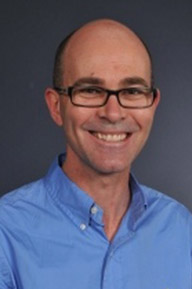 Gary McLean, PhD
Gary McLean, PhD
Imperial College London
Developing a vaccine for human rhinoviruses
Gary McLean, Ph.D. completed his Ph.D in pathology at the University of Otago in New Zealand and performed postdoctoral studies at the University of British Columbia (Canada) and Albert Einstein College of Medicine (USA). He then joined the Faculty at the University of Texas Health Science Centre Houston (USA) before relocating to London, UK where he is now a Reader in Molecular Immunology at London Metropolitan University. He also holds an honorary research position at Imperial College London in the Airways Disease Infection Section of the National Heart and Lung Institute. His current research investigates the adaptive immune response to rhinovirus infections – the aim of his research is to generate novel therapeutic interventions or a protective vaccine to rhinovirus. He has published 25 papers in peer-reviewed scientific journals in serves as an editorial board member and reviewer of numerous reputed journals in immunology.
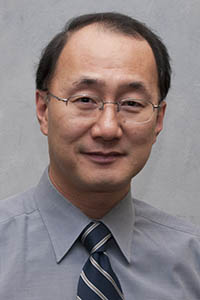 Kyoung-Jin Yoon, DVM, PhD
Kyoung-Jin Yoon, DVM, PhD
Iowa State University
Molecular evolution of PRRSV under experimental and field conditions
Kyoung-Jin Yoon, DVM, MS, PhD, Diplomate ACVM is a Professor in the Department of Veterinary Diagnostic & Production Animal Medicine at the College of Veterinary Medicine, Iowa State University and is also serving as Section Leader of Virology and Molecular R & D at the Veterinary Diagnostic Laboratory in the College. Dr. Yoon’s main areas of expertise and research include Viral Diseases of Animals particularly swine, such as PRRSV, Influenza, PEDV, rotaviruses, PCV2, and the development of diagnostic tools.
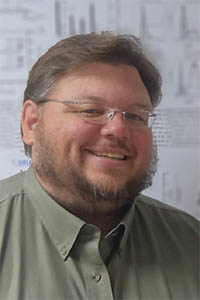 Kevin Legge, PhD
Kevin Legge, PhD
University of Iowa
Dendritic cell regulation of influenza virus immunity
Kevin Legge, Ph.D. is an Associate Professor of Pathology at the University of Iowa. He received his B.S. in Microbiology from the University of Tennessee in 1994 and a Ph.D. from the University of Tennessee in 2000. He completed his postdoctoral work at University of Virginia. Dr. Legge’s research is focused on the induction and regulation of the adaptive immune response to pulmonary pathogens. His current research focuses on the areas of peripheral control of pathogen specific CD8 T cells responses by dendritic cells in the lungs, dendritic cell regulation of the developing CD8 T cell response in the regional lymph nodes following influenza virus infections, immunity following vaccination against influenza vaccination, and the effects of chronic alcohol on pulmonary adaptive immunity. Dr. Legge is also a collaborating research member of the Nanovaccine Initiative consortium originating at Iowa State University.
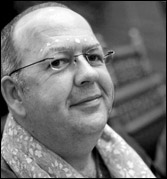 Adrian Shepherd, PhD
Adrian Shepherd, PhD
University of London, Birkbeck
Informing HIV immunogen design by characterizing clonal related sequence sets with NGS
Adrian Shepherd, Ph.D. is a Reader in Computational Biology in the Department of Biological Sciences at the University of London, Birkbeck. He arrived at his current academic position via an unusually circuitous route. With a first degree in History of Art and having spent six years working outside academia (as Information Officer for a welfare rights charity and as a journalist), he started a Masters in Computer Science at UCL in 1991. This included a module on neural computing, from which began a continuing interest in machine learning.
 Michael Katze, PhD
Michael Katze, PhD
University of Washington
Systems Biology of Infection and Immunity-Deadly Virus Infections in the 21st Century: Successes, Challenges, Ebola, and Networks to Nowhere?
Michael G. Katze, PhD, is Professor of Microbiology at the University of Washington and Associate Director for Molecular Sciences at the Washington National Primate Research Center. He is also the Director of the Nonhuman Primate Core Functional Genomics Laboratory for AIDS Vaccine Research and Development, funded by the Division of AIDS, National Institute of Allergy and Infectious Diseases.
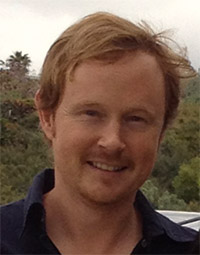 James Binley, PhD
James Binley, PhD
San Diego Biomedical Research Institute
Induction of anti-HIV-1 Neutralizing Antibodies using Native Trimer Immunogens
James Binley, Ph.D. is a Professor at San Diego Biomedical Research Institute, SDBRI. Dr. Binley earned his Ph.D. in Immunology/HIV in 1995 from The Scripps Research Institute and the University of Sheffield, UK. He completed a post-doctoral fellowship at Aaron Diamond AIDS Research Center in New York in 1999. He was an Instructor at the Weill Medical College of Cornell University. In 2001, he returned to The Scripps Research Institute as Staff Scientist. In 2004, he established his laboratory at Torrey Pines Institute for Molecular Studies. In 2014, he became a founding member of SDBRI.
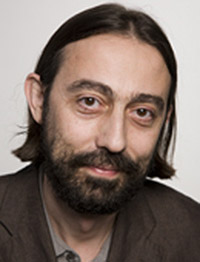 Adolfo Garcia-Sastre, PhD
Adolfo Garcia-Sastre, PhD
Mount Sinai School of Medicine
A universal influenza virus vaccine approach based on chimeric hemagglutinins
Adolfo Garcia-Sastre, Ph.D. is a Professor in the Department of Microbiology and the Director of the Global Health & Emerging Pathogens Institute at Mount Sinai School of Medicine in New York. He is also Principal Investigator for the Center for Research on Influenza Pathogenesis (CRIP), one of five NIAID Centers of Excellence for Influenza Research and Surveillance (CEIRS). Together with Charlie Rice, he is the leader of the basic research component on Viral Therapeutics and Pathogenesis of the North East Biodefense Center proposal, which was funded by NIAID and involves the collaboration of more than 20 academic institutions in New York, Connecticut and New Jersey.
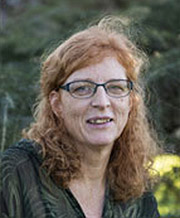 Nicole Baumgarth, DVM, PhD
Nicole Baumgarth, DVM, PhD
University of California, Davis
Local and systemic B cell responses to influenza virus infections
Nicole Baumgarth, Ph.D. is a Professor in the Pathology, Microbiology & Immunology Center for Comparative Medicine, at the University of California, Davis, School of Veterinary Medicine. The Baumgarth Lab investigates the basic immunological mechanisms that regulate and control immunity to pathogens. They aim to reveal the signals that drive a protective B cell response and to determine how these responses might be disregulated by certain pathogens. They are also interested in understanding the development and the role and function of a small innate-like B cell subset, termed B-1 cells.
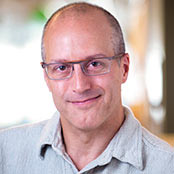 Roland Strong, PhD
Roland Strong, PhD
Fred Hutchinson Cancer Research Center
Reverse engineering HIV bnAbs: how hard it is to get antibodies to do what you want them to do
Roland Strong, Ph.D. is a biophysicist by training and a fundamental scientist by vocation. Strong has dedicated three decades to determining the structures and interactions of some of the most important molecules of life, from the antibodies involved in fighting disease to the markers on viruses that trigger an immune response. Dr. Strong received his B.S. in Biophysics in 1984 from the University of Michigan and his Ph.D. in Biophysics from Harvard University in 1990.
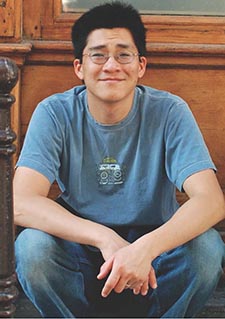 Kelly Lee, PhD
Kelly Lee, PhD
University of Washington
Novel approaches to map structural determinants of antigenicity in viral glycoproteins
Kelly Lee, Ph.D. is an Assistant Professor in the Department of Medicinal Chemistry, University of Washington, as well as an Adjunct Assistant Professor in the department of Microbiology, University of Washington. The Lee Lab’s research in the Department of Medicinal Chemistry, University of Washington focuses on the structure and dynamics of membrane fusion proteins in influenza and HIV, with the goals of understanding how the specialized glycoprotein machinery from each virus mediates membrane remodeling during cell invasion and determining how they interact with cellular receptors and antibodies. By analyzing structural order of viral the proteins and protein complexes in solution, one gains insight into isolate-specific differences in epitope order and presentation that can be correlated with antigenicity and potentially vaccine immunogenicity.
 Nancy Haigwood, PhD
Nancy Haigwood, PhD
Oregon Health Sciences University
Clues to Generating Highly Cross-Reactive and Neutralizing Antibody Responses in Primates Using Natural HIV Envelopes
Nancy L. Haigwood, Ph.D., is a Senior Scientist, Professor of Molecular Microbiology and Immunology, and Director of the Oregon National Primate Research Center at Oregon Health & Science University. She led the preclinical development of one of the first HIV vaccines at Chiron Corporation and was founding director of the Viral Vaccines Program at the Seattle Biomedical Research Institute. The primary focus of her research is the role of neutralizing antibodies in mother-to-child transmission of HIV-1 and the development of novel vaccines designed to elicit these antibodies.
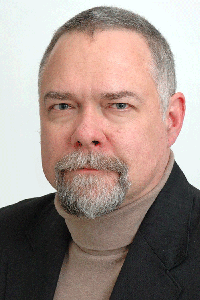 Thomas B. Kepler, PhD
Thomas B. Kepler, PhD
Boston University
B cell lineage dynamics during serial immunizations
Thomas B. Kepler, Ph.D., is Professor of Microbiology at Boston University School of Medicine and of Mathematics and Statistics at Boston University. The Kepler laboratory develops computational tools and applies them in the context of systems-level experimentation to address outstanding questions in immunology and vaccine development. Much of their work is centered on antibodies and the population dynamics of the B cells that produce them.
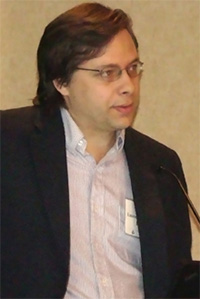 Laurent Verkoczy, PhD
Laurent Verkoczy, PhD
Duke University
Knock-in models for studying the development of immunization-guided HIV-1 broadly neutralizing responses
Laurent Verkoczy, Ph.D., is Assistant Professor of Medicine and Pathology at Duke University Medical Center and directs the Laboratory of B-cell Immunoregulation at the Duke Human Vaccine Institute. Dr. Verkoczy also serves as a B-cell Focus Investigator in Duke’s Center for HIV/AIDS Vaccine Immunology & Immunogen Discovery (CHAVI-ID) consortium. He obtained his Ph.D. in Immunology from the University of Toronto in 2000 and completed post-doctoral studies at The Scripps Research Institute in 2005.
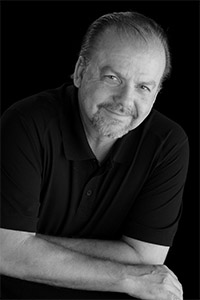 Raymond R. R. Rowland, PhD
Raymond R. R. Rowland, PhD
Kansas State University
The role of host genetics in the design of PRRS vaccines
Raymond “Bob” Rowland, Ph.D., is a Professor in the Diagnostic Medicine and Pathobiology department of Kansas State University’s College of Veterinary Medicine. Dr. Rowland’s current research interests center on addressing fundamental problems in infectious diseases caused by emerging pig viruses. The current focus is on molecular mechanisms of diseases caused by porcine reproductive and respiratory syndrome virus (PRRSV) and porcine circovirus type 2 (PCV2). Related research includes the design and development of novel detection and vaccine approaches, as well as the control of PRRS in the field. This research has contributed to several publications and review articles.
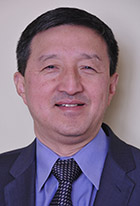 Shan Lu, MD, PhD, MHA
Shan Lu, MD, PhD, MHA
University of Massachusetts
Polyvalent HIV Vaccines
Shan Lu, MD, PhD, MHA, is a professor at the Department of Medicine, University of Massachusetts Medical School and a pioneer in gene-based vaccines. In the last two decades, he has used the DNA vaccination approach to develop and optimize vaccines against HIV-1, bioterrorism (plague, smallpox, anthrax and botulinum) and emerging pathogens (SARS, seasonal and pandemic influenza), pathogens causing chronic infectious diseases (hepatitis viruses and h-CMV) and pathogens causing neglected infectious diseases, including diarrhea (cholera and EV71).
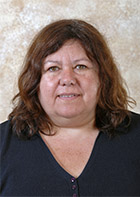 Elizabeth Rieder, PhD
Elizabeth Rieder, PhD
ARS-USDA Plum Island, Animal Disease Center
Genetic and Antigenic Variability of Foot-and-Mouth Disease Virus: a practical problem
Elizabeth Rieder, PhD received her M. Sc. Degree in Biochemistry (1986) and a Ph.D. in Virology and Genetic (1991) from the University of Buenos Aires in Argentina. Her doctoral studies involved the molecular mechanism of Foot-and-Mouth Disease Virus (FMDV)-escape mutant generation, isolated under selective immune pressure. Following receipt of her Ph.D., Dr. Rieder was a Research Scientist (1991-1997) at PIADC, USDA, ARS and studied FMDV pathogenesis and developed experimental FMDV vaccines through the generation of an infectious cDNA clone for this virus.
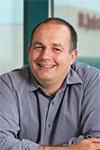 Richard Webby, PhD
Richard Webby, PhD
St. Jude’s Children’s Hospital
Antigenic variation and human immune responses
Richard Webby, Ph.D. obtained his undergraduate and graduate degree from the University of Otago, New Zealand. His Postdoctoral studies were conducted at St. Jude Children’s Research Hospital where he remains as a faulty and Member of the Department of Infectious Diseases. He is Director of the World Health Organization (WHO) Collaborating Center for Studies on the Ecology of Influenza and the NIAID/NIH-funded St Jude Center of Excellence in Influenza Research and Surveillance. His research interests lie in understanding the virologic properties of influenza virus transmission and pathogenicity through dissecting the human-animal interface. Data gathered through these activity are used to inform WHO recommendations for influenza vaccine compositions.
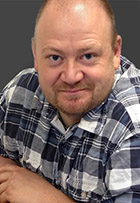 David Verhoeven, PhD
David Verhoeven, PhD
Iowa State University, CAHDIT
Equine Influenza HA3 Antigen Induces Immunological Responses against Multiple Strains of Flu
David Verhoeven, PhD, is a Research Assistant Professor in the Department of Biomedical Sciences and Center for Advanced Host Immunobiotics and Translational Comparative Medicine at the College of Veterinary Medicine, Iowa State University. Dr. Verhoeven’s main areas of expertise and research include Respiratory Pathogen Diseases of children, such as Influenza, RSV, Streptococcus pneumoniae, nontypeable Haemophilus influenzae, CD4 memory T-cell activity, and HIV vaccine research/pathogenesis.
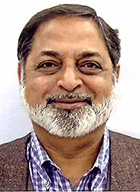 Sudhir Paul, PhD
Sudhir Paul, PhD
University of Texas Houston Medical School
Electrophilic Immunogens (E-Immunogens) For Amplifying Broadly Neutralizing Antibodies (bNAbs) TO HIV
Sudhir Paul, PhD, is Professor of Pathology and Director, Chemical Immunology Research Center at the Univ of Texas Houston Health Sciences Center. After his Ph.D. in Biochemistry from the All-India Institute of Medical Sciences in 1981, Dr. Paul was a Humboldt Fellow until 1983 at Christian Albrechts Univ, Gemany. He served as Asst Professor at Univ of Oklahoma until 1987 and then moved to Univ of Nebraska Medical Center, where he was Assoc Professor and then Professor of Pharmacology, Pathology and Anesthesiology until 1998. Dr. Paul has published more than 190 original articles, reviews and book chapters, and he has edited several books and conference proceedings on catalytic antibodies, HIV vaccination, amyloid disease and autoimmunity. He has delivered over 250 invited seminars and symposium presentations.
